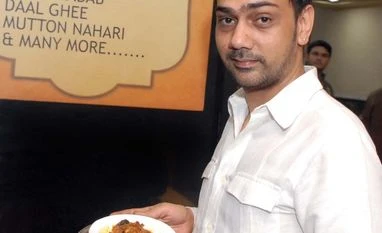Last Thursday, when Sanjay Dutt stepped out of jail, he proved that there may be such a thing as a free lunch after all. To celebrate the Munnabhai star’s release, a restaurant in Mumbai served a special dish free-of-charge for one whole day. The trigger for this gesture was friendship and not fandom. Rashid Hakim, the owner of Bhendi Bazaar’s Noor Mohammadi Hotel, is one of Dutt’s closest friends but while the actor is a fan of Hakim’s culinary skills, the restaurateur hasn’t seen many of Dutt’s films. “Who has the patience to sit through movies for three hours?” asks Hakim, whose appetite for Bollywood starts and ends with the most famous dish on his menu: Chicken Sanju baba.
Since 1986, when Hakim’s father Abdul was in charge, Dutt has frequented the 93-year-old establishment known for its nalli nihari, a slow-cooked lamb dish. Hakim and his elder brother, Khalid, are third-generation owners. While Khalid runs the hotel, mainly looking after administration, Hakim experiments with the food offerings. Salman Khan, Supriya Sule, Adnan Sami and Daler Mehndi are among the patrons of the restaurant. M F Husain, a regular, once drew a sketch on the walls to show his approval.
Some years ago when a young Hakim was experimenting in the kitchen, he offered Dutt a taste of an invention he calls white biryani. The actor was so impressed, he told him about his own special procedure for making chicken gravy. “I cooked some for him. He said it tasted better than what he would make.” The dish was christened ‘chicken Sanju baba’.
In a span of about eight years, this has become almost as popular as the restaurant’s signature nalli nihari. The formula is unique in that it includes garam masala whole instead of ground as well as onions, dry fruit and coconut. Admirers of Dutt come from Delhi and Gujarat for a taste, says Hakim. He recalls the story of a Jain vegetarian family where the parents allowed their daughter, an ardent fan of the actor, to sample it.
More than an admirer, Hakim sees himself as Dutt’s friend. He was among the people who accompanied the actor to his mother Nargis’ grave in Marine Drive. When Dutt was out on parole, he went with him to the dargah in Dongri. The decision to give away ‘chicken Sanju baba’ for free between noon and midnight on February 25 was a grand gesture to thank Dutt whose dish has boosted business further. It was no publicity stunt, he insists, because he announced the plan months ago on radio. Roughly 1,100 kilos of the delicacy were given away for free to a crowd that included the homeless and the well-heeled.
The restaurateur supposedly never takes selfies with Dutt, or uses his name to win favours. There isn’t even the clichéd claim to fame in the form of a framed photo. He has a lot of sympathy for the actor, who, he claims, was not given special treatment in Yerwada Central jail. The term he served, according to Hakim, is enough because he was not directly involved in the bomb blasts of 1993. “He is a very good man,” he says, adding with the concern of a friend. “He seems to have aged in prison.”
Since 1986, when Hakim’s father Abdul was in charge, Dutt has frequented the 93-year-old establishment known for its nalli nihari, a slow-cooked lamb dish. Hakim and his elder brother, Khalid, are third-generation owners. While Khalid runs the hotel, mainly looking after administration, Hakim experiments with the food offerings. Salman Khan, Supriya Sule, Adnan Sami and Daler Mehndi are among the patrons of the restaurant. M F Husain, a regular, once drew a sketch on the walls to show his approval.
Some years ago when a young Hakim was experimenting in the kitchen, he offered Dutt a taste of an invention he calls white biryani. The actor was so impressed, he told him about his own special procedure for making chicken gravy. “I cooked some for him. He said it tasted better than what he would make.” The dish was christened ‘chicken Sanju baba’.
In a span of about eight years, this has become almost as popular as the restaurant’s signature nalli nihari. The formula is unique in that it includes garam masala whole instead of ground as well as onions, dry fruit and coconut. Admirers of Dutt come from Delhi and Gujarat for a taste, says Hakim. He recalls the story of a Jain vegetarian family where the parents allowed their daughter, an ardent fan of the actor, to sample it.
More than an admirer, Hakim sees himself as Dutt’s friend. He was among the people who accompanied the actor to his mother Nargis’ grave in Marine Drive. When Dutt was out on parole, he went with him to the dargah in Dongri. The decision to give away ‘chicken Sanju baba’ for free between noon and midnight on February 25 was a grand gesture to thank Dutt whose dish has boosted business further. It was no publicity stunt, he insists, because he announced the plan months ago on radio. Roughly 1,100 kilos of the delicacy were given away for free to a crowd that included the homeless and the well-heeled.
The restaurateur supposedly never takes selfies with Dutt, or uses his name to win favours. There isn’t even the clichéd claim to fame in the form of a framed photo. He has a lot of sympathy for the actor, who, he claims, was not given special treatment in Yerwada Central jail. The term he served, according to Hakim, is enough because he was not directly involved in the bomb blasts of 1993. “He is a very good man,” he says, adding with the concern of a friend. “He seems to have aged in prison.”
)